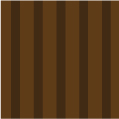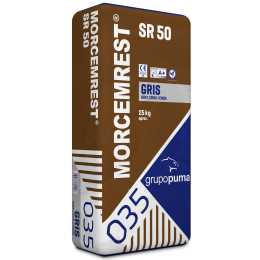 Morcemrest® SR 50
Morcemrest® SR 50

Single-component R4 repair mortar with impressive performance for great thickness. Formulated with sulphate-resistant cement.
Corrosion inhibitors version also available.
Additional information
Technical Caracteristics
Product based on special cements, selected aggregates and additives, reinforced with fibres.
Advantages and Uses
- Resistance to sulphates
- R4 class according to EN-1504-3 repair mortar Great adhesion to concrete and high module.
- High thixotropy.
- No sagging (suitable for ceiling application).
- Permeable to water vapour.
- Great resistance to chloride. Resistance to freeze-thaw cycles.
- Joints fillings among concrete sections, prefabricated elements, and expansion joints. Compensated retraction to minimize the risk of cracks.
- Resistance to carbonation. Resistant to open air.
- Repairs of structural elements such as: Columns, bridge beams, treatment plants, tunnels, pillars with high load transfer.
- General structural concrete repair.
VERSION CONTAINING INHIBITORS: MORCEMREST SR 50Q.
- The corrosion inhibitors chemically bond to the steel.
- They protect and passivate the reinforcement against chlorides and corrosive agents.
- They reduce the critical chloride concentration during the initial oxidation period compared to a standard mortar.
- They reduce the rate of corrosion propagation compared to a standard mortar.
Durability
Carbonation rate and water vapour diffusion coefficient.
Tests carried out at the Eduardo Torroja Institute for Construction Science according to UNE EN 12390-10 - Determination of resistance to carbonation of concrete under atmospheric levels of carbon dioxide, yielded a carbonation rate (K) of 0.222 mm/year0,5 for Morcemrest SR 50 and 0.478 mm/year0,5 for Morcemrest SR 50Q.
These values can be incorporated into models for estimating the service life of reinforced concrete elements due to corrosion and used to calculate the carbonation depth using the equation: P = K * t0,5, where “P” is the carbonation depth in mm, “K” is the carbonation rate in mm/year0,5, and “t” is time in years.
For example, substituting values into the equation, over 50 years, a section of Morcemrest SR 50 mortar will carbonate 1.57 mm, and 2.22 mm over 100 years. A section of Morcemrest SR 50Q mortar will carbonate 3.38 mm over 50 years and 4.78 mm over 100 years.
Similarly, a 25 mm-thick layer of Morcemrest SR 50 mortar would take 12,682 years to fully carbonate, while a layer of Morcemrest SR 50Q would take 2,735 years. In both cases, these durations far exceed the expected service life of the structure, even without considering the contribution of potential surface protection renders.
Based on tests carried out at the Eduardo Torroja Institute for Construction Science in accordance with UNE EN 12390-11 – Determination of resistance to chlorides, unidirectional diffusion, the following results were obtained:
For Morcemrest SR 50, a non-steady-state chloride diffusion coefficient (D) = 2.236 × 10⁻¹² m²/s
For Morcemrest SR 50Q, a non-steady-state chloride diffusion coefficient (D) = 3.035 × 10⁻¹² m²/s Both values can be incorporated into models for estimating the service life of reinforced concrete elements due to corrosion.
The chloride diffusion coefficients obtained are significantly lower compared to those provided in the Structural Code, Table A12.3.2.b, Annex 12. Similar coefficients to those obtained for Morcemrest SR 50 and SR 50Q can only be found in concretes designed with Type III/B cement and low water-to-cement ratios.
Suitable Substrates
- Substrate must be in good condition, clean, free of grease, oil and loose parts (minimum traction strength of 1.5 MPa).
- If necessary, prepare substrate mechanically until leave healthy concrete is reached.
- Absorbent substrates are previously dampened to the point of saturation, avoiding water-logging. Apply MORCEMREST SR 50 when surface has become matt again .
- If there are rebars, they must be cleaned of rust, grease and loose parts. Rusted parts must be cleaned, by sandblasting or with a metallic brush. Once cleaned protect them from rust with IMPLAREST C.
- When used in rigid joints between vertical and horizontal concrete walls and slabs widen before the joint by cutting it to a width of 10 mm with a radial arm saw, and then remove the so cut material.
Application Procedure
Mixing the mortar:
- Add 2/3 of water and progressively add the powder while stirring.Then add the rest of the water and mix for two more minutes The pot life of the mixture does not exceed 30 minutes at a temperature of +20 °C; therefore, do not mix more material than can be used.
Application:
- Apply MORCEMREST SR 50 with a trowel or using a paint gun, pressing to ensure its adhesion and to compact the material firmly.
- MORCEMREST SR 50 can be applied in several coats, being 5 mm the minimum thickness per coat. In vertical surfaces, thicknesses of up to 50 mm can be applied without the need for formwork. On horizontal surfaces, the maximum thickness is 100 mm.
- In walls and floors encounters fill the complete width of the joint.
Curing:
- Protect against wind, sun, and sun during hardening. To prevent excessive drying, it is advisable to cover the surface with damp sackcloth or plastic during the curing process. The curing process is essential in all cases.
Recommendations
- Do not add more water to the mortar than recommended, and do not remix. Do not apply below 5°C nor above 30°C.
- Do not add cement, sand, or other substances that may affect the properties of the material.
- The tools and equipment should be cleaned with solvent immediately after use to prevent the material from hardening, which will need to be removed by mechanical means.
- Consult with the Technical Department for any application not specified in this Technical Data Sheet. For any information regarding safety in handling, transportation, storage, and use of the product, please refer to the label and the updated version of the product's Safety Data Sheet.
- f the roughness of the substrate is adequate, no primer or bonding agent will be needed; in this case, prior dampening of the substrate will be necessary. The substrate should not be waterlogged. If a primer or bonding agent is required, apply IMPLAREST C.
- In manual applications, compact strongly between coats; in areas where compacting is difficult, we recommend application using mechanical processes.
- For further information regarding the preparation of concrete or steel reinforcements, please refer to the recommendations provided by standard UNE – EN – 1504 – 10.
- When applying the repair mortar without a bonding agent, the concrete substrate must be rough, clean, and well dampened beforehand, but the surface must be free of water at the time of application, meaning the substrate should not be waterlogged. The repair mortar must be applied by pressing it into the previously prepared substrate and compacted to avoid air inclusion in order to achieve the required strengths and to protect the reinforcements from corrosion.
Packaging and Storage
MORCEMREST SR 50 is supplied in 25 kg bags.
Shelf life: 1 year in sealed original packaging, sheltered from weather conditions and humidity.
Technical data
(Statistical data obtained under standard conditions)
| R4 REQUIREMENTS | PRODUCT DATA | |
| Appearance | GREY powder | |
| Density of product in Paste form | 2.0±0.1 gr/cm3 | |
| Granulometry | Dmax 2 mm | |
| Thickness by layer | 5 mm min. 50 mm max. |
|
| Compressive strength 28 days (EN 12190) | ≥ 45 N/mm² | ≥ 45 N/mm² |
| Chloride content (EN 1015) | ≤ 0.05% | ≤ 0.05% |
| Adhesion (EN 1542) | ≥ 2 N/mm² | ≥ 2 N/mm² |
| Resistance to carbonation (EN 13295) |
dk ≤ Control concrete (MC(0.45)) | Pass |
| Elasticity modulus (EN 13412) | ≥ 20 GPa | ≥ 20 GPa |
| Capillary absorption (EN 13057) | ≤ 0.5 kg / m² x h½ | ≤ 0.5 kg / m² x h½ |
| Thermal compatibility part 1 (EN 13687-1) |
≥ 2 N/mm² | ≥ 2 N/mm² |
| Sudden cooling cycles after high temperatures (50 cycles) (EN 13687-2) |
≥ 2 N/mm² | ≥ 2 N/mm² |
| Thermal compatibility part 4: Dry thermal cycle (50 cycles) (EN 13687-4) |
≥ 2 N/mm² | ≥ 2 N/mm² |
| CURVE RESISTANCE Compression: (EN 12190) 1 day 7 days 28 days |
≥ 10 N/mm² |
|
| Flexural strength: (EN 12190) 28 days |
≥ 7 N/mm² | |
| Immersion in sulphates and sea water after 365 days | Class R4 strength | Class R4 strength |
| Pot life of mixture | 20 - 30 minutes | |
| Mixing water | 17±1% | |
| Paste yield | 2.0 Kg/m2/mm | |
| Classification according to EN 1504-3:2006 Type |
R4 PCC Sulphate resistant |
|
| Chloride diffusion EN 13396 | Reference 0.14 | Result 0.03 |
CE Mark
|
GRUPO PUMA ESPAÑA , SL Avd. Agrupación Córdoba, Núm.17 14014 (Córdoba) 24 |
|
|
0370-CPR-2578 UNE-1504-3:2006
|
|
| Compressive strength | R4 Class |
| Chloride ion content | ≤ 0.05% |
| Bond strength | ≥ 2 MPa |
| Carbonatation resistance | Pass |
| Elasticity module | ≥ 20 GPa |
| Thermal compatibility part 1 | ≥ 2MPa |
| Capillary absorption | ≤ 0.5 kg.m2h0.5 |
| Reaction to fire | A1 |
Environmental Product Declaration (EPD)
Cement based mortar prepared with aggregates that are supplied close to the production center, which reduces the greenhouse gas emissions that would otherwise arise from their transport. Manufactured in production centers with an Environmental management certified system following ISO 14001 regulation, offering a firm promise of sustainability and respect for the environment.
Cement based mortar with type III ecological label (the most strict) Environmental Product Declaration
verified externally by AENOR.
Legal Disclaimer
GRUPO PUMA is not responsible, in any case, for the application of its products or constructive solutions carried out by the application company or other parties involved in the process and / or execution of the work, limiting the responsibility of GRUPO PUMA exclusively to the damages directly attributable to the supplied products, individually or integrated in systems, due to failures in their manufacturing process.
In any case, the drafter of the work project, the technical management or the person responsible for the work, or collaterally the application company or other parties involved in the process and / or execution of the work, must ensure the suitability of the products addressing the characteristics of them, as well as the conditions, support and possible pathologies of the work in question.
The values obtained by GRUPO PUMAS's products or its constructive solutions that, as the case may be, are determined by the EN standards or any other regulation that applies to it in each case refers exclusively to the conditions specifically stipulated in said regulation and that are referred to, among others, to certain characteristics of the support, humidity and temperature conditions, etc. without being them required in the tests obtained under different conditions, all in accordance with the relevant regulation.